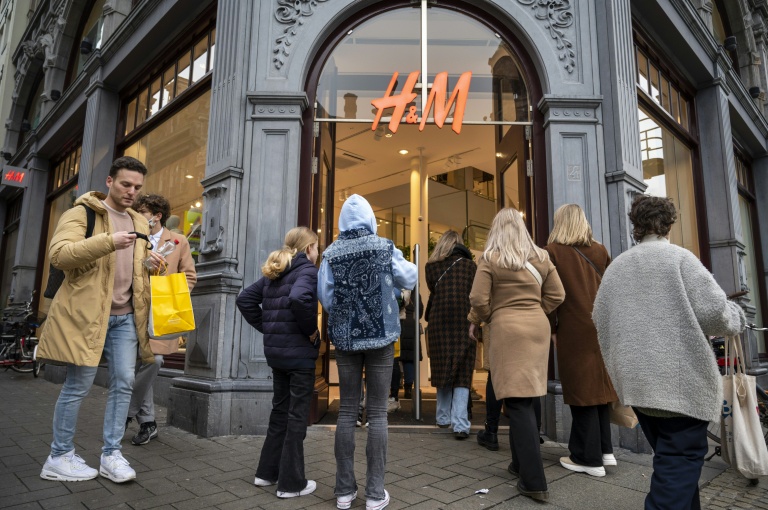Lifestyle
Dutch Shoppers Travel to Germany for Cheaper Prices Ahead of Elections

As high living costs grip the Netherlands, many Dutch citizens are turning to Germany for more affordable shopping options. On a recent trip, Marleen Naipal journeyed 400 kilometers from Rotterdam to Bocholt, Germany, to take advantage of significantly lower prices on cosmetics and other products. “I think some products are half the price, then the day trip is definitely worth it,” the 53-year-old hair stylist stated, noting that the cost of the round-trip bus ticket was approximately 40 euros (about $45).
The trend of cross-border shopping is becoming increasingly popular among Dutch bargain-hunters. Naipal’s bus trip, which included passengers from Rotterdam, Amsterdam, and Utrecht, is just one of many organized shopping excursions aimed at helping consumers save money. Bus driver Ali El-Abassi expressed sympathy for the shoppers, stating, “I find it really sad how high the price of groceries is in the Netherlands.”
Price Disparities Drive Shoppers Abroad
Data from a survey conducted by Dutch consumer watchdog Consumentenbond supports the perception that prices are higher in the Netherlands. The study compared over 130 common products across France, Germany, Belgium, and the Netherlands, revealing that items were, on average, 15 percent cheaper in Germany. In instances involving higher quality brands, the price difference reached up to 25 percent. The report specifically highlighted soft drinks, household goods, and drugstore articles as being notably less expensive across the border.
The report added, “In the Netherlands, these items are often on sale. But usually even the sale prices cannot compete with the price in Germany.” This sentiment resonates with consumers like Naipal, who are frustrated with the increasing cost of living. The upcoming elections on October 29, 2023, are likely to be influenced by these economic concerns.
Political analysts suggest that the rising cost of living is a primary concern for voters. Marcel Lubbers, a political science expert from the University of Utrecht, explained that many voters intertwine economic issues with other pressing topics such as housing and immigration. The recent success of far-right leader Geert Wilders in the 2023 elections can be attributed, in part, to his focus on purchasing power and the cost of living.
Government Investigations and Political Implications
The Dutch Authority for Consumers and Markets (ACM) recently initiated an investigation into supermarket food prices, looking into factors that contribute to the high costs. The ACM aims to address “territorial supply constraints,” which are believed to keep prices elevated in the Netherlands. Regulations requiring labels to be “easily understood” hinder retailers from importing bulk items from abroad, as these products may not have Dutch labels.
Additionally, taxation in the Netherlands adds to the financial burden. The value-added tax stands at 9 percent for groceries and 21 percent for non-food items, compared to Germany’s 7 percent and 19 percent rates, respectively.
For shoppers like Naipal, the financial strain is palpable. “It has just become very expensive in the Netherlands in a very short space of time. Many people are struggling to make ends meet on an average income. And that’s all about politics,” she remarked. The upcoming elections are viewed as a crucial opportunity for voters to express their concerns regarding the rising cost of living.
While political discussions are critical, Naipal and her fellow shoppers find immediate relief in their retail therapy. Displaying her purchases, she noted, “Just buying what I need, and maybe something extra if I see something really nice.” As the election approaches, it remains to be seen how these economic pressures will shape the political landscape in the Netherlands.
-

 Science2 months ago
Science2 months agoInventor Achieves Breakthrough with 2 Billion FPS Laser Video
-

 Health2 months ago
Health2 months agoCommunity Unites for 7th Annual Into the Light Walk for Mental Health
-

 Top Stories2 months ago
Top Stories2 months agoCharlie Sheen’s New Romance: ‘Glowing’ with Younger Partner
-

 Entertainment2 months ago
Entertainment2 months agoDua Lipa Aces GCSE Spanish, Sparks Super Bowl Buzz with Fans
-

 Health2 months ago
Health2 months agoCurium Group, PeptiDream, and PDRadiopharma Launch Key Cancer Trial
-

 World2 months ago
World2 months agoIsrael Reopens Rafah Crossing After Hostage Remains Returned
-

 Top Stories2 months ago
Top Stories2 months agoFormer Mozilla CMO Launches AI-Driven Cannabis Cocktail Brand Fast
-

 Entertainment2 months ago
Entertainment2 months agoMother Fights to Reunite with Children After Kidnapping in New Drama
-

 World2 months ago
World2 months agoR&B Icon D’Angelo Dies at 51, Leaving Lasting Legacy
-

 Business2 months ago
Business2 months agoTyler Technologies Set to Reveal Q3 Earnings on October 22
-

 Health2 months ago
Health2 months agoYouTube Launches New Mental Health Tools for Teen Users
-

 Health2 months ago
Health2 months agoNorth Carolina’s Biotech Boom: Billions in New Investments









